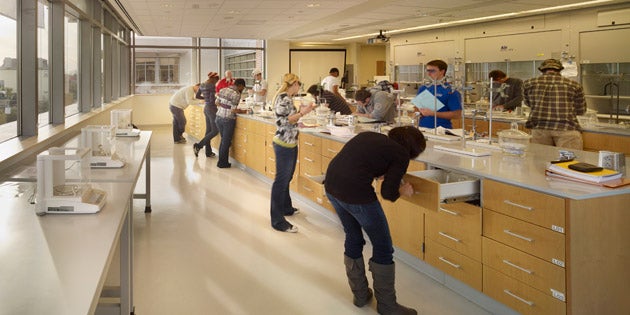College of Charleston Associate Professor of Physics and Astronomy Sorinel Oprisan’s expertise defies category – he has degrees in physics, theoretical physics, computer science and bioinformatics, and computational neuroscience. His widespread experience was an advantage for the students working in his computational neuroscience lab on three summer projects.
The six students working with him represent a healthy mix of his varied fields – three biology majors, two physics majors (one double majoring in computer science) and one visiting Edmond Community College student majoring in applied computational mathematics.
RELATED: Learn more about the College’s new computational neuroscience concentration
While the promise of neuroscience research, along with Oprisan’s infectious enthusiasm for his work, brought many of the student researchers into their summer projects, students Garrett Arnhold, Avery Cole, Derek Novo, Tevin Proctor, Derek Tuck and Kelsey Vollmer are learning about an unexpected side to the field.
“Computational neuroscience is a part of neuroscience, but neuroscience is so broadly defined,” Oprisan said.
“There are so many ways to study the brain. In computational neuroscience, you build computer models of the brain to simulate experiments. This allows you to look at the very small scale elements of the brain and build upon them.”

Clockwise from bottom left: Cole, Vollmer, Novo, Tuck, Ana Oprisan, Arnhold, Proctor and Sorinel Oprisan
Vollmer, a junior biology major, said the computational component of Oprisan’s research has dramatically widened her understand of neuroscience. “I was already interested in neuroscience when I learned about Dr. Oprisan’s research,” she explained. “His research gave me an entirely different perspective on it. I thought computational neuroscience sounded really cool, and speaking to Dr. Oprisan about it convinced me to pursue this research project.”
Vollmer is working with Tuck, a senior physics major, on a project focusing on the firing pattern of a single neuron when it receives multiple stimuli – in other words, they’re studying how the neuron reacts to different, sometimes conflicting, messages. Their research could eventually impact studies of diseases that affect neurons, like epilepsy and Parkinson’s disease.
RELATED: Check out the College’s physics, computer science and biology majors
The other students are paired working on two additional projects – Novo and Arnhold are studying networks of neurons that simulate how humans perceive the passage of time, and Cole and Proctor are focusing on fractals, repeating biological structures about which little is known.
“I have a strong background in biology, but I didn’t know anything about computer science,” Proctor said. “I’ve learned a lot about it this summer, especially the MatLab software we used for our experiments.”
Novo, too, credits his summer research and a signal and image processing course taught by Oprisan for inspiring his interest in a field he didn’t expect: computer vision systems (a discipline concerned with analyzing and simulating image processing in humans and machines). “I’d like to go to graduate school to get a degree in computer vision after I graduate,” Novo said.
Vollmer also plans to attend graduate school after her graduation from the College. “I’d like to get my doctoral degree in neuroscience,” she said.
The rest of Oprisan’s students weren’t certain about what will follow their undergraduate education. “I’m interested in dental school,” Proctor said. “If that doesn’t work out I would like to be a rock star.”
RELATED: Discover Oprisan’s research in computational neuroscience
Proctor and Tuck, whose backup plan is also to be a rock star, contend that their summer research experience will aid them in whatever comes next. “Presenting our projects at poster sessions and conferences has helped my public speaking,” Tuck said.
“We’ve tried a lot of things through these experiments,” Proctor added. “Some of them failed, so we just regrouped and tried again. It’s been a valuable learning experience.”
Novo, and Tuck will present their research at an international meeting of the Society for Neuroscience in Washington, D.C. in November 2014. Arnhold will present his summer research results during the National Science Foundation’s Research Experience for Undergraduates meeting at Central Washington University, Wash. Vollmer, Tuck, Proctor and Cole will present during the “Celebration of Scholars” poster session on the College’s Convocation Day, August 18, 2014.
The College is one of few universities in the U.S. to offer an undergraduate concentration in computational neuroscience. Oprisan will teach one course in computational neuroscience in the fall 2014 semester, Biophysical Modeling of Excitable Cells, along with another course, General Physics for Science Majors.





